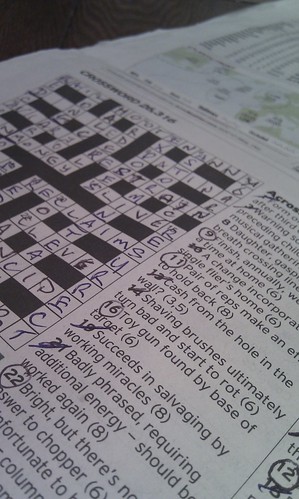Interesting blog post I ran across. Though my dad does Google, he still reads the physical paper. It got me thinking about how technology changes us. We'll read some about this later, but any thoughts for the comment box now?
(No, this is not an assignment, but an exchange of ideas on the way the world works around us and on us.)
My Dad Doesn’t Google: "
We have been spending some time with my Dad who has been visiting us from Australia. During his stay with us I realised, more than usual, how the internet makes no impact on his life. It led me to think through the behaviours that many of us have grown accustomed to.
I kind of get the impression that members of his generation either made a choice to have a computer and so eventually to use the internet, or indeed let it pass them by. My Dad worked in insolvency for many years, times of tape dictaphones and typists. His business offices were all about paper information and it was physically organised. I remember book keeping – spreadsheets must have been a sight for sore eyes.

Dad lives in South Australia for most of the year now and enjoys writing letters to us about all of his adventures. His penmanship is fantastic and I always enjoy reading them. It almost feels strange to hold a personal message for me, handwritten with a fountain pen. Usually his missives are two or three pages of A4. We may have learned to communicate via 140 characters (or less) but what has that restriction done to old fashioned letter writing? What have we given up?
I was lucky enough to have
Google Voice Search demonstrated to me by the mobile Product Manager at the Teacher Academy in London. It works really well and with the new
Froyo 2.2 update will allow you to control much of your phone with just your voice. I showed Dad and tried it with the search term “Best restaurants in Adelaide”. As the phone recognised what I had said and immediately displayed a map with the eateries he was pretty impressed. Then he went through the list and said, “Eaten there, yes and that one, and that one, enjoyed the starters there…” He hadn’t done such a search but had probably visited these places in his own journey to find out the restaurants he enjoys. Perhaps they were recommended, but I can safely say he wasn’t swayed by a single online review. What experiences he must have enjoyed exploring those places. His opinion probably contradicted that of some reviews – good that he hadn’t run that search after all, perhaps he would have missed out. How much do we truly make up our own mind these days?

If we so choose, we can control a deluge of information and news to come to us, on our mobiles, on our televisions. A constant feed or stream. Every day Dad heads to the shops to buy the newspaper. That is his way of gathering the daily news, from the printed press. The obvious criticism is of course that it is from one source, but what must he gain everyday from his journey to gather it? Would you walk somewhere to pick up a blog update? The physical act of collecting it is an investment, everything is a click away for us, we don’t invest in the gathering of information in the same way – we can pick it up and drop it just as quickly. It is the impact of this on the information sources themselves that is the most intriguing.
Every evening/morning he listens to the radio, well he calls it the “wireless” – my “wireless” is no less important to me.
The crossword he does is the cryptic one, you know the really tricky one. He doesn’t jump on Google at the first sign of trouble but puts it to one side and gets a cup of tea. He lets the information brew as well and slowly he forms connections with something he read here, a past crossword clue there or a fact he knew. It might take a few moments or a few hours but suddenly he would let out a victorious serendipitous yelp as he figures it out.
Not a search query in sight other than his own synaptic workout. Sometimes he finished the puzzle, sometimes not, but he has probably on average 18-24 moments of serendipitous victory a day. That can only be good for your brain.
It has been interesting to make these comparisons in internet and non-internet use, however I wouldn’t change the way I interact with it now. It offers me a great perspective on my self and my work. It allows me to connect to others both near and far. I can find out stuff without really trying, I don’t even need to type.
But my behaviours raise questions too – do we have a stronger sense of self nowadays or are we too reliant on our networks, connections to others and “you may also like”? Can we form genuinely unbiased opinions of products and services, restaurants and experiences with the internet? Do we need to? Will the good in life always rise to the top of the web? There are things we don’t consider important anymore because we can Google it – surely the journey to the papershop can be just as important as what we collect.
Thanks Dad for causing me to think this through.
I say more yelps of serendipity please.
http://edte.ch/blog/2010/08/15/my-dad-doesnt-google-2/?utm_source=feedburner&utm_medium=feed&utm_campaign=Feed:+edte/baKo+(edte.ch+blog) accessed 9/13/2010















































 [/caption]
[/caption]